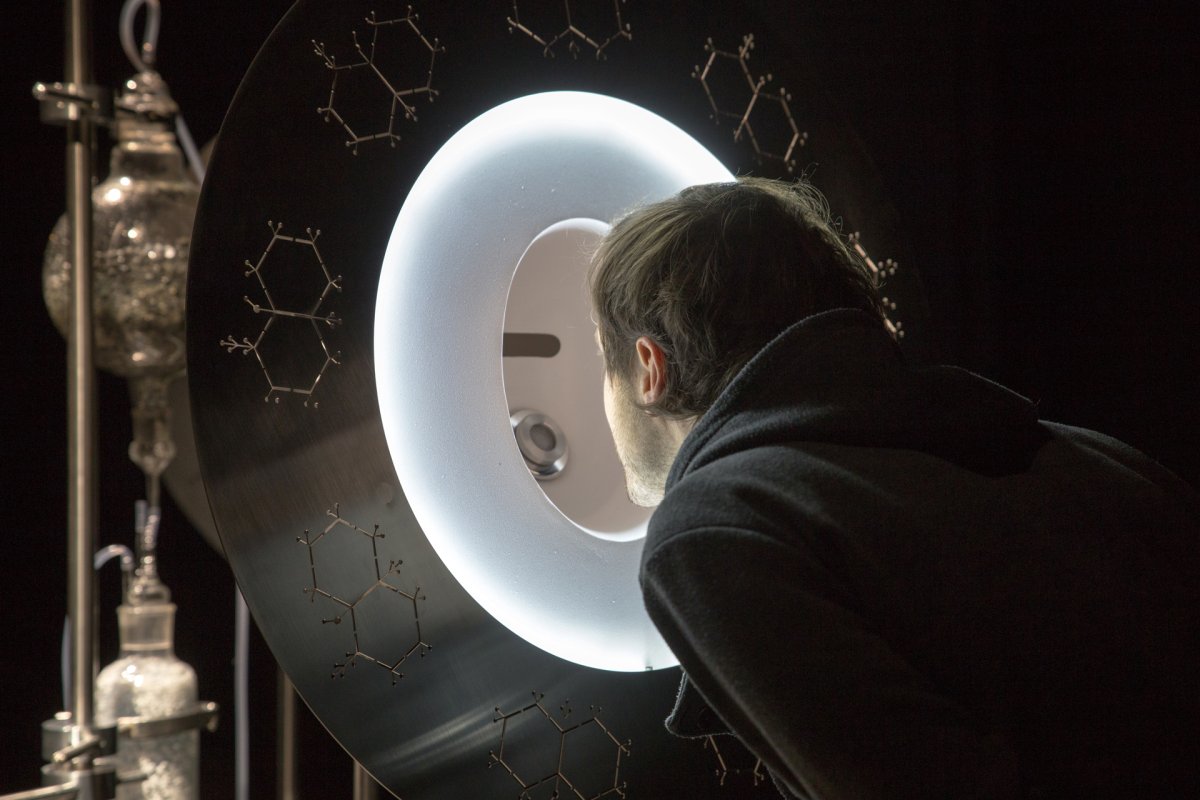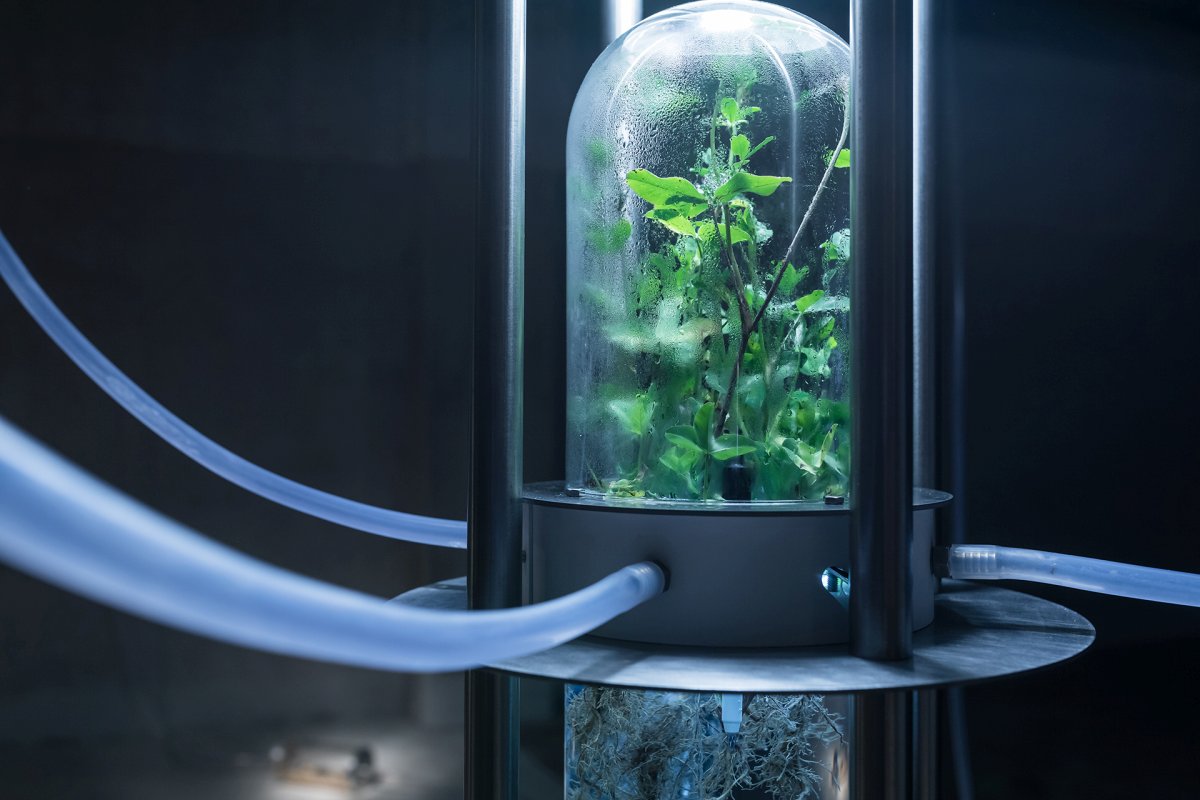Sensorium
#7 Stockpiling Food For Thought with Saša Spačal
This is edition #7 of Stockpiling Food For Thought - the Sensorium Quarantine Weekly Special, with Saša Spačal.
From underground mycelium systems to socio-political systems and personal dimensions, Saša Spačal invites us to dive deep into the inconspicuous relationships between “the organic, the biological, the living” and the technological. She reflects on how COVID-19 further highlights various inequalities but also opens potential doors for new ideas about the future.
Saša Spačal is an artist working at the intersection of living systems research, contemporary art and sound art. Her work focuses primarily on the posthuman condition in which human beings exist and act as one of many elements in the ecosystem and not as sovereign individuals.

Sensorium : Where are you writing from, what is your situation?
Saša Spačal: At the moment I am in isolation, safe and healthy with my family in Ljubljana. COVID-19 pandemic forced me to pause a year-long artist-in-residency program in Amsterdam at Waag Society, Mediamatic and Vrije Universiteit, where I was researching underground mycelium flows and developing a series of new artworks.
My first weeks of isolation, during the self-imposed 14 day quarantine, passed by in a peculiar clouded state of uncertainty and anxiety. In the microcosmos of my home I became ears and eyes, reading and listening, while obsessively trying to map out the shift in reality that was in becoming. This shift had a bit of a different character for people in Slovenia than in other countries, since one day after the pandemic was declared, a very controversial government was installed which contributed a lot to the stress levels of many citizens. All of a sudden we were faced with an unprecedented situation infused with fear for survival and with absolutely no confidence in the government that was supposed to organize the country's lockdown. Unfortunately the initial distrust turned out to be justified since already in the first week very troubling stories started coming out of the parliament. COVID-19 crisis in Slovenia has become a tool for sociopolitical and economical exploitation.
While mapping the crisis I am observing several threads of pandemic entanglement across the planet: health threat to biological bodies, sociopolitical actors playing out everything from war scenarios to empathic care, however there is also silence, stillness and clear blue sky, all of which I will miss greatly once we all re-emerge from isolation.
Sensorium : What could be interesting for an artist in the topic of illness?
Saša Spačal: Personally, I have never worked specifically with the topic of illness artistically, but as we are witnessing at the moment with the COVID-19 crisis, illness is a particular biological situation that echoes across several scales of reality. Illness is not just an extreme biological event for the body it affects, but also a wider socio-political entanglement in which the sick body is immersed and dependent. Illness and especially a worldwide pandemic has a crystallizing ability to identify societal vulnerabilities. Illness crystallizes the situation and shows how many different perspectives and communities a particular society is able to include in their rescue processes and how or which ones it will neglect or downright ignore.
Hopefully the desired impact of artworks working with illness is to produce knowledge and experience of the phenomena from many different perspectives, widening the field of understanding what particular illness implies, which mechanisms power it and which are being neglected. To my mind comes one of our works Meta_bolus , realized in collaboration with microbiologist Mirjan Švagelj, in which we explored how the aroma of wet leaves is intertwined with the history of human resistance to antibiotics and how particular pharmacological doses, known as boluses in medical jargon, define relationships as either beneficial or adverse. Pharmacological negligence in the case of antibiotics affects not only humans with potentially deadly consequences, but also soil bacteria Streptomyces rimosus. This bacteria emits seducing geosmin aromas which can evoke the memory of forest after rain, while also being used on a global scale to produce about one metric ton of antibiotics every five hours for human medicine as well as animal and plant production. Such an excessive human exploitation of Streptomyces rimosus bacteria is not really needed, since it is actually the human overproduction of the substance which defines it as a non effective medicine, not the substance itself. As a gesture of giving back the surplus of human taking, antibiotics and the geosmin produced in the laboratory structure of the installation are returned back to the soil and offered to the visitors to smell via olfactory metabolic receptors in a form of a gathering.
 Photo: Karolina Prica
Photo: Karolina Prica
What I wish to see and work on in the future are artworks, which would induce care for humans and also more-than-humans, such as animals, plants, microorganisms, fungi, by evoking particular connections or vulnerabilities that are being overlooked and forgotten. Some people say that pandemic is the first worldwide drill practice for more events that will follow due to the climate crisis, thus I would say that care is a very important practice that we as species have to research and further develop for each other and others.
Sensorium : What role can art play in pandemic situations like we are experiencing now?
Saša Spačal: Human understanding of the world is produced through production of meaning that artists are very much part of and work with, thus partly responsible for world formation by generating concepts, senses, names, methods. Of course this is not just the role of artists, however this is our daily practice. With our works we generate realities with particular ethical responses that can define living conditions of humans, more-than-humans. I think that the questions for artists and everyone else in the time of pandemic are which worlds do we want to evoke and what kind of realities do we want to summon with our actions? Answers are multiple and diverse as we are all different and far from the same living in different microcosmic circumstances. With that being said, I do believe that now more than time for art, is time for each other since a lot of us have to reconfigure professional lifestyles and relationships due to pandemic uncertainty.
Sensorium : Some people say this pandemic will accelerate a wider paradigm shift in society. Do you agree? Can you describe how you see the importance and potential impact of this event on a larger scale?
Saša Spačal: The pandemic is definitely opening new horizons, however we are still faced with forces of repetition such as violence, greed, exploitation, racism, patriarchy which emerge alongside war metaphors employed in political statements describing the COVID-19 crisis. If some horizons open with governments discovering that they can act generously and emphatically towards their citizens despite stressful and uncertain situations, other horizons are witnessing the rise of biosurveillance and the loss of human rights.
Sensorium : When we look at biomimetics, where natural design elements and processes are used as a model for new materials, devices and tools, it is clear that tech is very closely bound to natural phenomena. Some people see the emergence of new tech - such as the internet of things as a second nature, or rather not as a separate actor but as an inherent consequence of natural evolution. There is a very particular connection between tech and nature in your work. It brings me to ideas of technology actually always being the part of natural systems. What do you think about this idea?
Saša Spačal: The words nature or natural make me uneasy and restless, they recall discrimination of women, who were too natural to be on equal terms with rational and enlightened men, suffering of non-binary relationships, which were deemed as not natural, and hardships of indigenous tribes, too close to nature, not civilized enough, considered as inferior beings and even denied the status of being alive. I hear history of discrimination and suffering in that word, that is why I try to use it as little as possible and replace it with organic, biological or living. Consequently, I prefer to use a living network of relations or entanglement to describe the multiplicity of connections that humans, more-than-humans and nonliving elements of this planet enact and depend on. One of my works, Earthlink, is a system of biotechnological installations exploring environmental relations in connection to human breathing.
As you can see from my work, technologies evolving alongside human, animal and plant species are for me very much a part of the inter- and intra-connected environment-culture continuum. What needs to be questioned over and over again in these relationships is the politics and consequences of technologies since they are not neutral, but close and personal. As Bernard Stiegler has taught us with the exteriorization and prosthetisation of human consciousness into matter, every technology carries with it particular perception and also particular blindness. Metaphor of the environment or the planet as a system is one of the blind spots, since as it was noticed by Anna Tsing, the system implies narratives of progress, it obscures vulnerability, uncertainty and indeterminacy, emphasizes intentionality and causality thus ignoring unplanned serendipities and unpredictable encounters, such as worldwide spread of COVID-19 for example.
Thank you for your questions and greetings from my microcosmos to yours!
 Photo: Miha Godec
Photo: Miha Godec